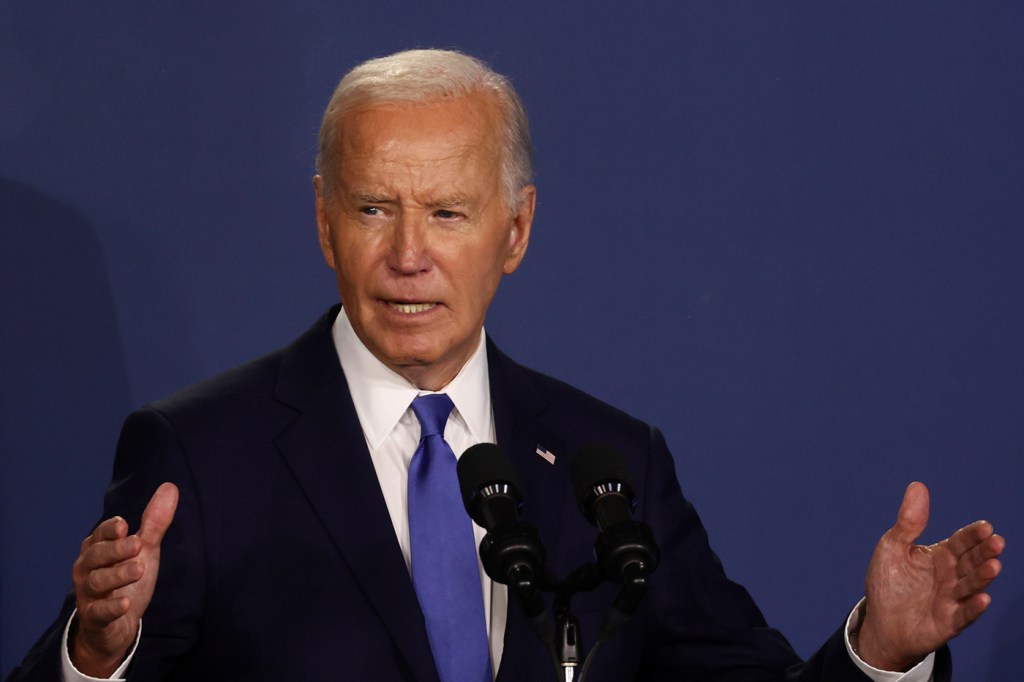Did President Biden save his candidacy? He ‘may have stopped the bleeding — for now,’ expert says
The rare press conference comes at a precarious moment for Biden and the Democrats. Pressure has been building on Biden to step aside ever since his disastrous debate performance on June 27.

The fallout from a worst-case-scenario debate showing for President Joe Biden may have stalled — if for the moment — Thursday evening during his first solo press conference in eight months.
Biden answered questions from reporters at the conclusion of a three-day NATO Summit in Washington, D.C. — a performance that a Northeastern University political scientist says may have “stopped the bleeding, at least for now.”
“His responses to questions were more crisp than in recent days, but still not razor-sharp,” says Costas Panagopoulos, head of Northeastern’s political science department. “Clearly the president is lucid and coherent, even if he is not as quick and sharp-edged as he has been in the past.”
“Overall, stronger and better, if not amazing,” he adds. “Supporters probably breathed a sigh of relief, but there was little to dissuade detractors.”
After delivering his prepared remarks, the president read reporters’ names off a piece of paper, one by one. Their questions focused on the question of whether Biden should stay in the race, but also touched on a range of foreign policy matters — from the future of NATO, to the Russia-Ukraine and Israel-Hamas wars and relations with China.
Biden’s biggest blunder of the press conference came during his answer to the first question when he mistakenly referred to Vice President Kamala Harris as “Vice President Trump.”
“Look, I wouldn’t have picked Vice President Trump to be vice president [if] I think she’s not qualified to be president,” Biden said.
Asked later whether he thinks Harris would be fit to lead should it come to it, Biden touted her qualifications — from her role in rallying the country around reproductive rights to her record as a prosecutor.
“She is qualified to be president; that’s why I picked her,” Biden said.
Asked about his ability to handle the stress of the job over the next four years, Biden suggested he needed to pace himself more. He also suggested that his staff is to blame for overloading him with travel and other commitments.
“My schedule has been full bore,” Biden said. “I always have an inclination, whether I’m playing sports or doing politics, just to keep going and not stop. I just got to pace myself a little bit more.”
The rare press availability comes at a critical moment for Biden, his candidacy and the Democrats. Pressure has been building on Biden to step aside ever since his disastrous debate performance on June 27, including calls from mainstream Democrats.
The CNN-sponsored debate took place in Atlanta according to new rules — muted microphones, no studio audience, no opening statements and two commercial breaks. While the format seemed to restore some civility after Trump’s frequent insults and interruptions during their 2020 debates, it saw Biden flounder when given ample time to respond to Trump and the questions posed by moderators Dana Bash and Jack Tapper.
Featured Posts
In an attempt to stop the bleeding, Biden sat down with ABC News’ George Stephanopoulos for an extended interview. Stephanopoulos was later approached by a stranger on the streets of New York City and asked whether he thought Biden could serve a second term, to which the anchor responded: “I don’t think he can serve four more years.”
This week, reporters with the White House press corps clashed with Biden press secretary Karine Jean-Pierre over doctors’ visits. The Washington Post reports that an expert in Parkinson’s disease had met “multiple times” with the president’s primary physician — visits that Jean-Pierre tried to address with reporters during the contentious July 8 briefing.
Biden delivered the conference on Thursday as a bookend to the NATO Summit, coming just hours after he mistakenly introduced Ukrainian President Volodymyr Zelensky as “President Putin” before correcting himself.
Publicly, 17 Democrats in the House and one in the Senate have called for Biden to drop out of the race. Politico reported Thursday afternoon that “at least a half dozen lawmakers” will drop their support for Biden if the NATO conference didn’t go well.
Several high-profile celebrities have also called for Biden to step aside, including actor and mega Democratic fundraiser George Clooney, who shared his thoughts on Wednesday in a now widely read New York Times op-ed.
But all the media attention on Biden in recent days has for Dan Kennedy, professor of journalism at Northeastern, felt like a bit of a feeding frenzy. Looking back at the last several weeks, Kennedy says it’s almost as if “we’ve forgotten that anything else is going on in the entire world.”
“At some point when we look back on this, we’re going to say that there was a really important, substantive issue that had to be dealt with — that is, the question of whether the president is in cognitive decline — and yet the media still didn’t acquit itself very well,” Kennedy says.
Kennedy says he thought that Biden fared far better this week than he did during last month’s debate, but that “it probably didn’t change things that much.”
Panagopoulos says that in the end, the press conference “didn’t erase concerns about [Biden’s] physical and mental health.”
“It’s unlikely to silence calls for him to step aside,” he says.
Northeastern political scientist Nick Beauchamp says Biden’s performance was “fine, if imperfect,” and the conference went as well as he had expected.
“I don’t know if that’s going to be enough of a difference for people who are counting on his abilities,” Beauchamp says. “But I think he went out there and delivered what he was there to do.”












